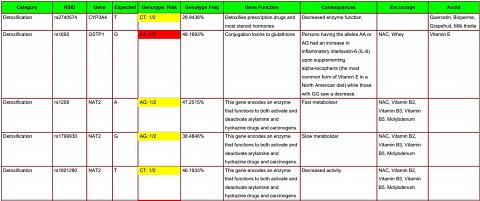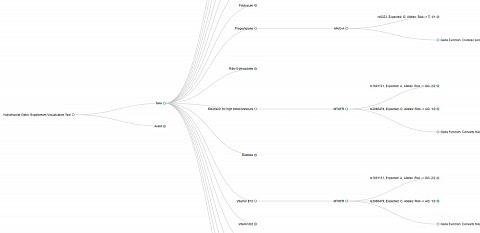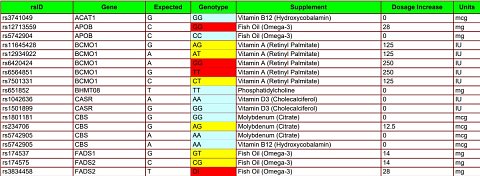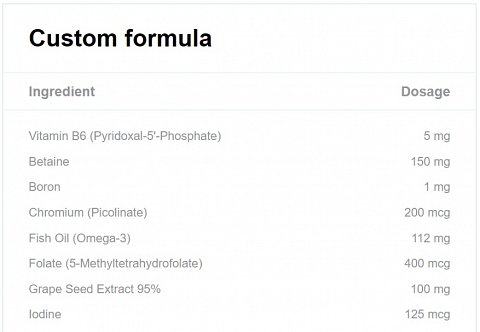-
Detox and Methylation Mutation Report
review on April 12, 2018
by Rebecca Fishwick

At a Glance
Summary
Overall, the NutraHacker site was simple and straightforward to navigate, and the information included in my reports seemed very comprehensive. However, my results were not easy to understand without existing scientific knowledge and I would have had to do a significant amount of independent research to fully understand the results.
That said, I did appreciate that this was a free service, and was perhaps intended to be used by people with existing knowledge of genetics or nutrition, rather than general consumers. I’d therefore recommend this service to those that are willing to either consult a nutritionist with this information, or are mostly interested in purchasing tailored supplements.
Full Review
NutraHacker was founded in 2013 by two UCLA graduates: Jon Vinea, a biochemist with six years of research experience, and Mark Austin Wagoner, an expert in databases and statistics. Their aim is to build a system to deliver comprehensive DNA analysis, and to answer genetic questions behind common and debilitating health conditions, such as chronic fatigue syndrome.
NutraHacker is an online service for analyzing your genetic data to identify variants associated with detoxification and methylation. They offer free a ‘Methylation/Detoxification Report’, but also provide the option of purchasing more in-depth analyses, such as those that look at carrier status and depression.
Product Expectations
I read that NutraHacker would use a combination of my genetic data and information about my health that I would provide anonymously. It would then produce a report telling me which nutrients I was encouraged to increase, and which I should avoid. I read that the test would help me to personalize my list of supplements.
There were six different types of report: the ‘Methylation/Detoxification Report’, the ‘Supplement Report’, the ‘Carrier Status Report’, the ‘Celiac Report’, and various depression and fitness reports. The Methylation/Detoxification and Supplement Reports were offered for free, whilst the others cost between $20 and $85.
I opted for the Methylation/Detoxification Report, which also included the Supplement Report. There was no obvious explanation of what methylation or detoxification were and I also read that the service would examine 58 SNPs – again, there was no explanation of what these were. As I discovered after a Google search, SNPs, or single nucleotide polymorphisms, are genetic variations found at specific points in the DNA sequence that lead to variation between individuals. The report would be generated using my genetic data and a 32-question health survey which – while anonymous – would be used for research.
Ordering Experience
I was offered the option of either signing in with my 23andMe profile or uploading a .txt file of my genetic data from 23andMe or AncestryDNA. I chose to sign in with 23andMe and was directed to a page where I granted NutraHacker access to my information, which included my genetic data, full name, and service type I’d purchased from 23andMe (i.e. ancestry report, health report, or both). Since it was a free service, there was no online checkout to go through.
After granting access, I had to select the name of the person whose genome I was uploading (mine was the only option, since it was the only one linked to my account) and I was pleased to read that my name would not be stored permanently. After clicking submit, it took under two minutes to upload my file.
Once it had uploaded, I was asked to answer a survey comprising 34 questions (not 32 as listed on the site), all of which were health-related but anonymous. I didn’t find this survey especially user friendly: I have no known health conditions, and so it would have been helpful to have a ‘No to all’ option, instead of having to go through the whole list item by item.
While there was no explicit ‘Terms and Conditions’ form, I did have a look at the Privacy Policy. This was very short, which made it quite straightforward, as there were no long lists and no “lawyer speak” to get through, and it was really only a reiteration of their commitment to ensuring my privacy. However, I was surprised that there was no mention of what they would do with my data or how long they would store it after I’d uploaded it to the site.
The Results
Once I’d looked through the Privacy Policy, I entered my email address to receive the results, and was soon sent an email with links to my ‘Detox Report’ and ‘Detox Supplement Visualization Tool’, a link to create my own customized supplement from VitaminLab, and a link to my ‘Customized Supplement Formula Report’.
Results Section: Methylation/ Detoxification Report
The link to my ‘Detox Report’ took me to a combined report of detox and methylation mutation analysis. The term ‘methylation mutations’ was explained as “single nucleotide polymorphisms”, a term which was again left unexplained. The frequent use of technical language made the results difficult to understand, as it seemed that all of the findings were based on something that a person without specialist knowledge would not know the meaning of.
I was informed of how many mutations I had, and whether these were homozygous, heterozygous or sex-linked. Again, these distinctions were not explained, and I wasn’t sure whether they had any bearing on the results.
There was then a table consisting of ten columns: ‘Category’ (i.e. detox or methylation), ‘RSID’, ‘Gene’, ‘Expected’, ‘Genotype: Risk’, ‘Genotype Freq[uency]’, ‘Gene Function’, ‘Consequences’, ‘Encourage’ and ‘Avoid’ (shown below).

A snippet from the table included in my Methylation/Detoxification Report.
The ‘Gene Function’ and ‘Consequences’ columns contained the most useful data, as they told me what each gene did, and what the health implications might be. For example, I found out that the gene ‘CYP3A4’ was involved in detoxifying prescription drugs and steroid hormones. The consequence of my result was apparently decreased enzyme function, but I wasn’t sure what this meant in terms of what I would experience.
The ‘Encourage’ and ‘Avoid’ columns told me which nutrients I should include more and less of in my diet. However, as someone who isn’t a nutritionist, much of this information was meaningless to me. For the example given above, I was recommended to avoid quercetin, bioperine, grapefruit and milk thistle. While everyone knows what grapefruit is, I can’t say the same for quercetin or bioperine.
Results Section: Detox Supplement Visualization Tool
The ‘Detox Supplement Visualization Tool’ link took me to a webpage containing a collapsible tree diagram, showing me what nutrients I should increase or avoid (shown below).

A tree diagram showing which nutrients I should take or avoid.
Clicking on different points of the diagram caused it to expand or retract, so that I could explore different levels of information. While this was visually pleasing, there was nothing to explain what these nutrients were, what they did, or what foods they might be found in, and so it was not very accessible without specialist knowledge.
Results Section: Customized Supplement Formula Report
The ‘Customized Supplement Formula Report’ consisted of a table showing what nutrients I should take supplements of, in what dosage, and which genes made these ideal for me (shown below).

A part of the table included in my supplement formula report.
For most people (myself included), I felt that this report would be a bit too complex to use practically without extensive independent research or the advice of a nutritionist.
Results Section: Customized Supplement from VitaminLab
Finally, there was a link to purchase a ‘Customized Supplement’ from a company called VitaminLab, using my Customized Supplement Formula. Clicking on this link took me directly to an online shopping cart and checkout, which was a little startling, as at first glance it appeared I was already being charged. The supplement was priced at $49 per month (to be taken three times a day), and I could see all of the ingredients that comprised my formula before checking out (shown below).

Some of the ingredients included in my Customized Supplement Formula.
For a supplement, the price tag seemed a little high. However, the ingredients were tailored to my genetic needs, and so I thought it might be a worthwhile investment.
Summary
Overall, the NutraHacker site was simple and straightforward to navigate, and the information included in my reports seemed very comprehensive. However, my results were not easy to understand without existing scientific knowledge and I would have had to do a significant amount of independent research to fully understand the results.
That said, I did appreciate that this was a free service, and was perhaps intended to be used by people with existing knowledge of genetics or nutrition, rather than general consumers. I’d therefore recommend this service to those that are willing to either consult a nutritionist with this information, or are mostly interested in purchasing tailored supplements.


